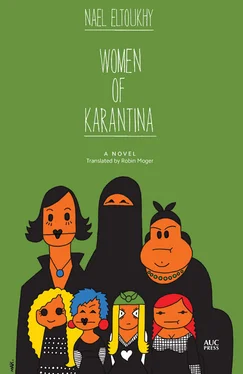Now Abu Amira turns his whole body to him. He brings his face up to his. His voice is low, unsmiling, and deadly: So the wife likes to enjoy herself. That’s nothing for her to be ashamed of. Doesn’t hurt anybody. It doesn’t hurt me. I couldn’t give a flying fuck either way. But when the man she’s with isn’t a man, well, that makes me very upset indeed. Upset for her. Upset for him as well. Especially if he’s going about acting the big man. Abu Amira chops his words out, parcels them up. Gives them bite. Abu Amira stops talking. He gestures to the waiter: Mr. Ali’s check is on me. The man’s our guest.
Abu Amira did not hold in disdain the things that are commonly disdained by most people. Certain things did not shame him. Others did. That’s how he was. Perhaps that’s what made him strong. More than once Ali tried to wound him with a taunt, to find that he was unwoundable. What can you do with a person that can’t be hurt? Nothing at all. Step by step, Ali entered the fold of Abu Amira’s family, not on equal terms this time, nor welcomed openly, but listening, asking, seeking counsel. Everyone starts off small. This lesson was needed to bring it home to Ali that things had changed.
At their next meeting Ali asks Umm Amira if she’s told Abu Amira what had happened between them. Well, of course, she shouts, he’s my husband! Ali doesn’t understand these people. He grabs her by the arm. Your husband or not, he doesn’t concern me. He’s nothing to me and I couldn’t give a fuck either way. A little pimp and I couldn’t care less about him. What I do care about is that what happens between us stays between us. She frees her arm from his grip. Stares at the floor a while, then back at him. Shame on you, Mr. Ali. Abu Amira’s not a bad man. It’s not right for you speak of him like that. The man gave you everything. Ali is incandescent with rage. He rants and raves. Hits her. Gave us everything how, you whore? He kicks her in the stomach. She holds his gaze and doesn’t make a sound. When he’s done she gathers up her things and leaves. She gives him one long look, a look he doesn’t understand.
When he is alone again, he will remember the monthly sum that Abu Amira sends to his apartment — a helping hand for the newlyweds — and the many gifts, from meat and fruit and hash all the way through to the television and the living-room furniture. He weeps for a bit. He remembers everything: his double-crossed father, his debt of vengeance cast aside, Ain Shams, his brother Mustafa. Today, it is Mustafa he remembers in particular; Mustafa, without whom they would not be here. He gets up to call Mustafa. For the first time since leaving Cairo, he calls him; with no plan in mind, he calls him from his house phone. He whimpers, asks him how things are in Cairo. Mustafa barks at him. Don’t think you’re coming back now. Concentrate on making a living and when things have calmed down, I’ll call you. Ali replaces the receiver. Ali continues to weep.
The next morning he drops in on Abu Amira. Hands him a cigarette. They laugh together. They slap their palms in resignation and when the opportunity presents itself, in the course of their conversation, Ali gets up and kisses his shoulder.
It was a hard lesson, but there you go: the true lessons, the ones that teach us truths, are always hard.
In those days Alexandria was simmering.
The seaside city had engaged in many struggles in defense of its independence and that of its citizens. Indeed, the only way to describe Alexandria’s struggles against the Egyptian authorities is as a manifestation of the margin’s struggle against the center. The authorities against which Alexandria struggled were not just the Egyptian authorities; they were local as well.
One day, Alexandria awoke to news of a young Egyptian’s murder — a young man called Khaled Said — at the hands of police informers. The young man was tortured, beaten up, and his head staved in. That same day a page was set up on Facebook entitled “We are all Khaled Said,” with nearly a hundred thousand subscribers joining within the first day, a number that swelled in the days that followed to reach half a million on the eve of the 2011 revolution. Alexandria was filled with demonstrations of every stripe: thousands thronging the Corniche, black-clad in memory of Khaled, and violence too. Then there was the dramatic elevation of two icons of the opposition, ElBaradei and Ayman Nour, to challenge the iniquitous dispensation of Mubarak and his family. But all that was just the tip of the iceberg.
Alexandria is a cosmopolitan city. At least, that is what it was before the revolution of July 1952, which was followed by the systematic expulsion of foreigners from Egypt, and thus from Alexandria, in which were concentrated the country’s largest European communities. From that moment on, one felt a sense of loss in Alexandria, a sense of glories past and dissatisfaction at the wretched present. This feeling curled through the air, carried along on the waves of the sea, by birds in the heavens, by men on the sidewalks.
Three governors the Alexandrians fought tirelessly against: Ismail al-Gousaqi, Abdel Salam al-Mahgoub, and Adel Labib — and since the struggle against reformist authorities is always fiercer and more vital than that against reactionary authorities, the battle with the last two was bloodier by far. When, for instance, al-Mahjoub decided to confine all microbuses (what the Alexandrians call “ferries”) to a single station in Karmouz, away from the two rail hubs of Sidi Gaber and Masr, the drivers assembled at their accustomed stops, pulled up the handbrakes, and refused to move. In the end, the police were forced to intervene. They fired shots into the air. Only then did the strikers disperse, and then only after one of them was killed.
This incident was a rehearsal for a bigger show. One autumn day in 2004 a fishmonger called Fedda Amin al-Madawiya persuaded the municipal council to order the demolition of a villa in Laurent once owned by a former ambassador by the name of Mofeed Aboulghar, after he had sold it to her — to Fedda — by a properly registered contract. The vast majority of Alexandrians took a different view from that of the municipality. For weeks they had been following the reports written by a dynamic investigative reporter — and member of the independent Future Party — called Amal Sabour; reports that made much of the villa’s aesthetic, historical, and architectural merits while at the same time shedding light on Fedda al-Madawiya’s attempts to force Aboulghar to sell it to her, which had culminated in falsifying charges (among others, prostitution and drug dealing) against some of his relatives. One and all, the inhabitants of Alexandria massed in front of the bulldozer that had come to knock the villa down on the orders of Fedda, the building’s legal owner. The scene concluded with the bulldozer halting before the mob that sat in solidarity with the former ambassador. It came back to complete its task another day, but only after the case had received its share of publicity, the scene with the stationary bulldozer having taken on a significance equal to that of Rachel Corrie singlehandedly facing down the Israeli bulldozer.
This tale went hand in hand with another, also significant. Alexandria’s governor ordered the banning of shisha from the city’s cafés, part of a plan to ban the sale — the consumption, even — of cigarettes, itself part of a plan to turn Alexandria into a “smoke-free city,” itself part of the governor’s plan to become Director-General of UNESCO. Yet free-born Alexandrians remained unmoved by such lofty considerations. The café owners announced their objection and the governor ignored them. They announced a strike and he ignored them. They openly declared that they were ready to engage in acts of violence within the city limits. He ignored them. They set a date — Thursday, July 22, 2005—to cast the city into darkness. They gathered in small groups in various locations from Bahari to Miami and started smashing the streetlights along the Corniche by hurling pebbles, while those with firearms shot out the bulbs. The police arrested a few of them. They interrogated them and got nothing. In the end they let them go and the governor overturned his decree. The free-born Alexandrian knows that truth is worthless without the strength to protect it.
Читать дальше












